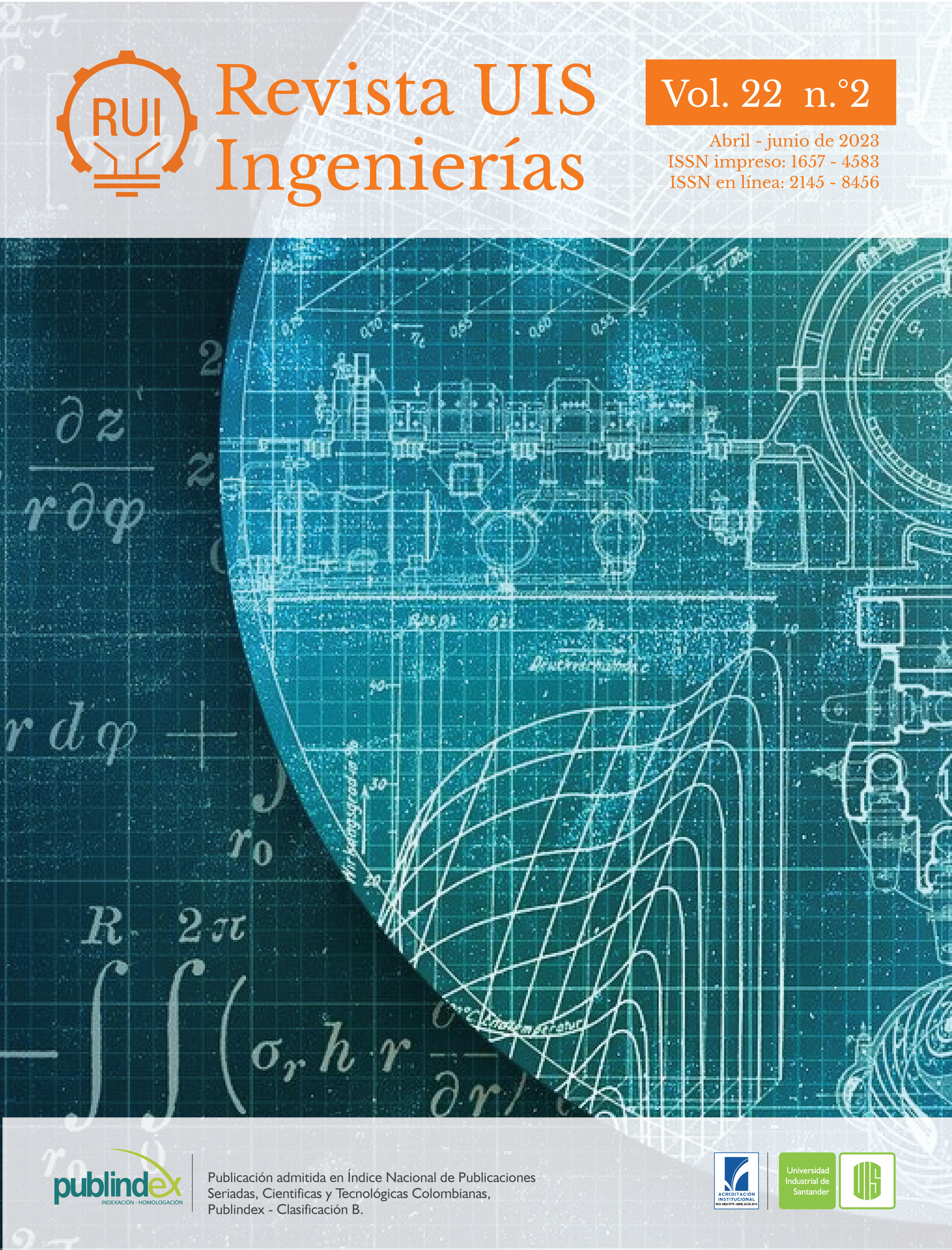Published 2023-04-07
Keywords
- combination linear,
- Dirichlet conditions,
- Neumann conditions,
- Robin conditions,
- contour
- partial differential equation,
- traffic Flow,
- positive semidefinite matrix,
- finite element method,
- numerical solution,
- tridiagonal ...More
How to Cite
Copyright (c) 2023 Revista UIS Ingenierías

This work is licensed under a Creative Commons Attribution-NoDerivatives 4.0 International License.
Abstract
In this document we will study and solve the nonlinear partial differential equation, with initial conditions for vehicle entry that serves to model the dynamics of traffic flow. To find a numerical solution to the dynamics that govern the behavior of traffic flow, the Finite Element Method in a spatial dimension was used. In accordance with the temporal dynamics, simulations were developed to know the flow in terms of time. The numerical solution is interesting for predicting the number of vehicles at the entrance to a high-flow road. Some theorems are enunciated that guarantee the existence of the solution and the uniqueness is given by the boundary conditions.
Downloads
References
- F. Pérez, A. Bautista, M. Salazar, A. Macías, “Analysis of vehicular traffic flow using a macroscopic model”, DYNA, vol. 81, no 184, pp. 36-40, 2014, doi: https://doi.org/10.15446/dyna.v81n184.38650
- N. A. Gasilov, Ş. E. Amrahov, “On differential equations with interval coefficients”, Mathematical Methods in the Applied Sciences, vol. 43, pp. 1825-1837, 2020, doi: https://doi.org/10.1002/mma.6006
- E. Zadobrischi, L. M. Cosovanu, M. Dimian, “Traffic Flow Density Model and Dynamic Traffic Congestion Model Simulation Based on Practice Case with Vehicle Network and System Traffic Intelligent Communication”, Symmetry, vol. 12, pp. 1-19, doi: https://doi.org/10.3390/sym12071172
- S. Mollier, M. Delle, C. Canudas-de-Wit, B. Seibold, “Two-dimensional macroscopic model for large scale traffic networks”, Transportation Research Part B: Methodological, vol 122, pp.309-326, 2019, doi: https://doi.org/10.1016/j.trb.2019.02.016
- Y. Wanga, W. Y. Szeto, K, Han, T. L.Friesze, “Dynamic traffic assignment: A review of the methodological advances for environmentally sustainable road transportation applications”, Transportation Research Part B: Methodological, vol. 111, pp. 370-394, 2018, doi: https://doi.org/10.1016/j.trb.2018.03.011
- K. Han, H. Liu, V.V. Gayah, T.L. Friesz, T. Yao, “A robust optimization approach for dynamic traffic signal control with emission considerations”, Transportation Research Part C: Emerging Technologies, vol. 70, pp. 3-26, 2016, doi: https://doi.org/10.1016/j.trc.2015.04.001
- Z. Luo, F. Teng, “An effective finite element Newton method for 2D p-Laplace equation with particular initial iterative function”, Journal of Inequalities and Applications, vol. 281, pp. 1-24, 2016, doi: https://doi.org/10.1186/s13660-016-1223-9
- Alberto Bressan, Khai T. Nguyen, “Conservation Law Models for Traffic Flow on a Network of Roads. Research Penn State”, Networks and Heterogeneous Media, vol. 10, pp. 255-293, 2014, doi: https://doi.org/10.3934/nhm.2015.10.255
- J. Ma, J. Cui, “Traffic Flow Density Distribution Based on FEM”, Physics Procedia, vol. 25, pp. 939-944, 2012, doi: https://doi.org/10.1016/j.phpro.2012.03.181
- H. Brézis, “Analyse fonctionelle. Théorie et applications”, Sciences Sup, Dunod, París, 1983.
- K. Han, T. L. Friesz, T. Yao. “A partial differential equation formulation of Vickrey’s bottleneck model, part I: Methodology and theoretical analysis”, Transportation Research Part B: Methodological, vol. 49, pp. 55-74, 2013, doi: https://doi.org/10.1016/j.trb.2012.10.003
- C. Marschler, J. Sieber, P. G. Hjorth, J. Starke, “Equation-Free Analysis of Macroscopic Behavior in Traffic and Pedestrian Flow”, SIAM J. Appl. Dyn. Syst., vol.13, pp. 1-17, 2014, doi: https://doi.org/10.1007/978-3-319-10629-8_48
- X. M. Chen, L. Li, Q. Shi, “Stochastic Evolutions of Dynamic Traffic Flow: Modelling and Application”, Berlin: Springer-Verlag, 2015, doi: https://doi.org/10.1007/978-3-662-44572-3
- F. Li, Wenyong Li, F. Xie. “Study on Finite Element Model of Traffic Flow based on Weighted Residual Method”, Procedia Engineering, vol. 24, pp. 495-499, 2011, doi: https://doi.org/10.1016/j.proeng.2011.11.2683
- F. V. Wageningen-Kessels et al, “Numerical diffusion in traffic flow simulations: Accuracy analysis based on the modified equation method”, 11th Trail Congress “Connecting people, Integrating expertise”, Netherlands, 2010, pp. 1-4.
- M. Makridis, A. Anesiadou, K. Mattas, G. Fontaras, C. Biagio, “Characterising driver heterogeneity within stochastic traffic simulation”, Transportmetrica B: Transport Dynamics, pp. 1-19, doi: https://doi.org/10.1080/21680566.2022.2125458
- S. M. Hossein Hosseini, M. Merkel, A. Öchsner, “Finite element simulation of the thermal conductivity of perforated hollow sphere structures (PHSS): Parametric study”, Materials Letters, vol. 63, pp. 1135-1137, 2009, doi: https://doi.org/10.1016/j.matlet.2008.10.009
- P. Y. Li, R. Horowitz, L. Alvarez, J. Frankel, A. M. Robertson, “Traffic flow stabilization,” Proceedings of 1995 American Control Conference - ACC'95, Seattle, 1995, vol. 1, pp. 144-149, doi: https://doi.org/10.1109/ACC.1995.529225
- F. V. Wageningen-Kessels, T. Schreiter, J.W.C. Lint, S. Hoogendoorn, “Modelling Traffic Flow Phenomena”, 2nd International Conference on Models and Technologies for Intelligent Transportation Systems, Lovaina, 2011, vol. 22-24, pp. 1-4.
- F. V. Wageningen-Kessels, H. Lint, K.Vuik, S. Hoogendoorn, “Genealogy of traffic flow models”, EURO J Transp Logist, vol. 4, pp. 445–473, 2015. https://doi.org/10.1007/s13676-014-0045-5

